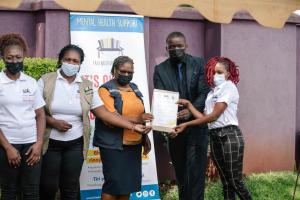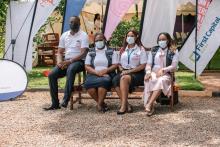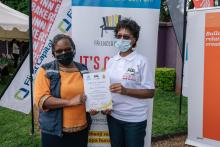Promoting mental health in the workplace in Zimbabwe
By Tatenda Chimbwanda
Harare, Zimbabwe – On average, every working Zimbabwean spends one third of their life at work. This is a lot of time employees are exposed to work-related stresses. Moreover, the COVID- 19 pandemic exacerbated the risk of Mental Health (MH) conditions and aggravated pre-existing ones. Yet, aspects that affect job performance, such as psychological wellbeing, remain largely unaddressed at the workplace. Most companies have very limited MH and Psychosocial Support (MHPSS) services offered in the workplace. Since, employees do not have the basic skills to screen themselves, there is a risk for people, if not properly and timely addressed, to experience severe MH conditions. A workforce struggling with serve MH conditions affects productivity for the employer and national economy. The limited MHPSS in the workplace is a result of treatment gap in Zimbabwe. The country only has 19 psychiatrists and 35 clinical psychologists against a population of 15 million.
Therefore, to address the MHPSS care gap, the Ministry of Health and Child Care (MoHCC), with support from the Friendship Bench (FB) and World Health Organization (WHO), developed a training programme called “MH in the workplace,” to improve and increase access to MHPSS services in the workplace. This program trains on the Problem Solving Therapy, a brief intervention that has been shown to significantly reduce the symptoms of depression and anxiety.
“We established a training programme under the Mental Health Strategic Plan (2019-2023) to strengthen and integrate MH services at primary health care level, community and workplace. This programme thrives on the FB’s community-based problem-solving therapy which will decentralize the MHPSS to narrow the treatment gap in the country,” noted MoHCC Mental Health Department Occupational Therapist Brighton Mufakwadziya.
The “MH in the workplace” intervention focuses on providing employees known as MH Champions with skills to screen for common distress symptoms and provides basic MHPSS care to individuals. It also helps the trained MH Champions to identify those in immediate need for clinical care and refer them to designated MH clinicians through the FB. After the MH Champions complete their training, they cascade the training within their organizations to ensure more people receive MHPSS.
“MH in the workplace is a game changer as it will enable us to reach out to more people who need MHPSS services in Zimbabwe. Through capacity building of lay counsellors who will create space in the workplace for those in need, our three key pillars of Friendship Bench will be utilized: 1) Kuvhura pfungwa (opening of the mind), 2) Kusimudzira (uplifting), and 3) Kusimbisa (strengthening),” says Professor Dixon Chibanda, Friendship Bench Director.
Thanks to the Norwegian Agency for Development Cooperation (Norad) generous funding, WHO Zimbabwe managed to support MoHCC, and FB implement MH in the workplace training programme. Since the inception of the MH in the workplace, 72 MH Champions from organizations such as Econet, PWC and NetOne have been trained, and these cadres in turn have trained their colleagues within their organizations. 35 organizations now have MH Champions at the workplace providing MHPSS services. The referrals through the FB open line number have also increased. Overall, 831 people were sensitized about MHPSS and 123 benefited from the Problem-Solving Technique (PST) sessions.
“The training I received from FB really changed the way I used to perceive problems at work. I used to struggle with providing solutions but, after the training, I enable people to come up with solutions to their own problems by utilizing three key pillars of FB. I am now skilled to identify and screen individuals with mental distresses, and I also have the knowledge of where to refer them so that they can get more professional help,” reflected Sarah Putire from Bonvie Medical Aid who is one of the MH Champion.
The MoHCC, with the support of FB and WHO Country Office in Zimbabwe, will continue to train more MH Champions to ensure the project expands in various organizations across the country. Moreover, MoHCC will continue providing real-time support, supervision, and mentorship to the trained MH Champions to reach at least 3000 clients by June 2022. More organisations can come on board to equip their staff with skills to detect and offer MHPSS. The MH in the workplace hopes to engage more organizations to send their employees for training. This also includes mobilizing companies to financially contribute towards further trainings of more MH Champions for programme sustainability.
“MH challenges are a risk for lost workforce productivity due to premature death, missed days from work (absenteeism) and impaired job performance (presenteeism). WHO Zimbabwe is committed to continuing to support the MOHCC to implement the activities in National Mental Health Strategic Plan such as MH in the workplace to increase access to mental health interventions that are effective.,” stated Dr Debra Machando, WHO Zimbabwe MH Specialist.




